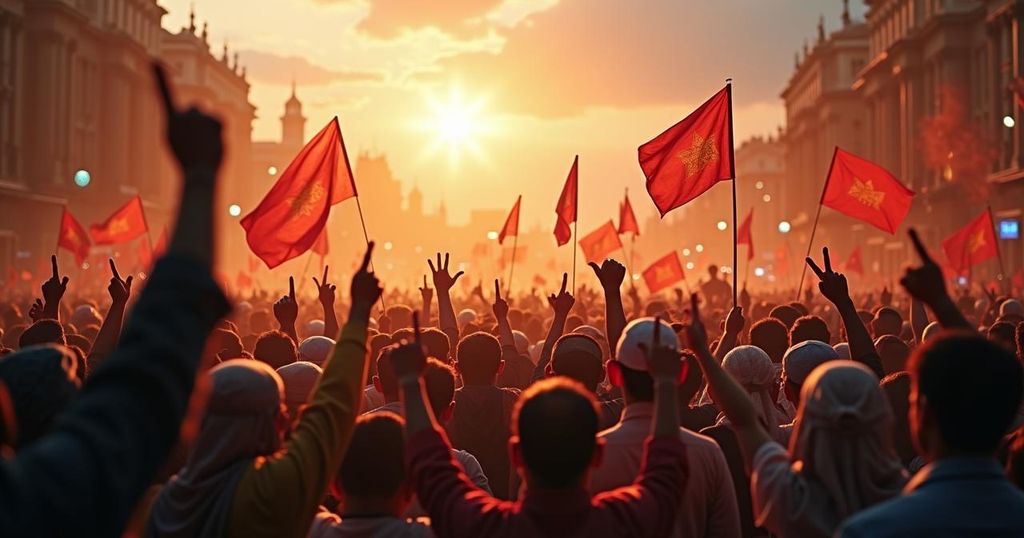The Muslim Brotherhood: Uprising, Elections, and Political Dynamics in Egypt

The Muslim Brotherhood engaged in Egyptian politics following the 2011 protests that ousted President Mubarak, achieving significant electoral success with the Freedom and Justice Party. Mohammed Morsi became president but faced mounting opposition, leading to a military coup in July 2013. Following Morsi’s ousting, a severe crackdown on the Brotherhood ensued, resulting in widespread arrests and violence, and culminating in the group’s designation as a terrorist organization.
In January 2011, protests led by a non-religious youth movement erupted against the Mubarak regime in Egypt, ultimately compelling President Hosni Mubarak to resign in February. The Muslim Brotherhood’s leadership initially hesitated but soon endorsed the protests and encouraged its members to join in. This marked a pivotal moment for the Brotherhood, allowing it to engage openly in Egyptian politics. They established a political party named the Freedom and Justice Party, which advocated for Islamic principles while promoting inclusive membership, encompassing women and Christians. In the elections held from November 2011 to January 2012 for the People’s Assembly, the Brotherhood’s Freedom and Justice Party secured approximately 47 percent of the available seats, establishing a significant presence in legislative politics, alongside the Islamist Nūr Party, which garnered around 30 percent. This success extended their influence into the Constituent Assembly tasked with drafting a new constitution. However, the political landscape shifted when Khairat al-Shater was designated as the Brotherhood’s candidate for the presidency. Upon being disqualified, Mohammed Morsi, the head of the Freedom and Justice Party, became the nominee and subsequently won the presidential election in June 2012. Morsi’s reign was marred by escalating dissent due to economic troubles and governance issues. A massive protest against his administration on June 30, 2013, prompted General Abdel Fattah al-Sisi to issue an ultimatum threatening military intervention if Morsi did not acquiesce to the protestors’ demands. Following Morsi’s refusal to resign, the military ousted him on July 3, 2013, subsequently leading to a broad crackdown on the Muslim Brotherhood. This crackdown included mass arrests, closure of affiliated media outlets, and violent dispersals of protests, notably on August 14, when over a thousand were killed. Eventually, the Egyptian government formally banned the Muslim Brotherhood, labeling it a terrorist organization—a characterization contested by the Brotherhood, which denied involvement in acts of violence.
The Muslim Brotherhood, established in the early 20th century, has played a significant role in Egyptian society and politics. Initially founded as a socio-political Islamic organization, it evolved into a formidable political force in the wake of the Arab Spring in 2011. The political landscape in Egypt drastically changed following protests that instigated the ousting of long-standing President Hosni Mubarak. This shift allowed the Brotherhood to participate legitimately in elections, garnering considerable support among the populace. Morsi’s presidency reflected a period of significant political upheaval. The initial hope for genuine democratic governance quickly gave way to disillusionment as the Brotherhood faced fierce opposition. The military’s subsequent coup in 2013 marked a significant regression in Egypt’s democratic process, leading to serious human rights concerns and repression of dissent. The Brotherhood’s designation as a terrorist organization further complicated its operation within the political sphere, impacting the balance of power in Egypt.
The events surrounding the Muslim Brotherhood in Egypt highlight the complexities of political transitions post-Arab Spring. Following their participation in a revolution and subsequent electoral victories, the Brotherhood grappled with governance challenges that led to mass protests and military intervention. The resulting crackdown on the Brotherhood under General al-Sisi’s leadership not only suppressed the group but also reflected broader issues concerning civil liberties and the future of democracy in Egypt. This sequence of events underscores the precarious nature of political movements in the face of entrenched power structures and societal divisions.
Original Source: www.britannica.com








